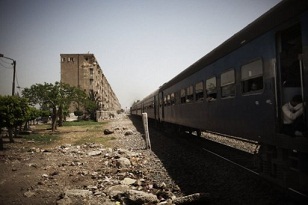CAIRO: Access to water and proper sanitation are human rights.
That was the message being broadcast loud and clear by UN-appointed independent expert Catarina de Albuquerque Sunday at a press conference held by the United Nations Information Center in Cairo.
De Albuquerque just wrapped up a week-long tour of the country in an effort to assess the state of drinking water and sanitation.
Egypt has a growing population and is considered “water scarce. De Albuquerque’s mission is both timely and necessary.
Under the auspices of the UN’s Human Rights Council and the Egyptian government, De Albuquerque visited Cairo, Alexandria, Qena and Luxor, where she looked at local facilities, equipment, labs and homes. She spoke with government officials, employees at water facilities, NGOs and ordinary people, seemingly with few restrictions.
De Albuquerque had expressed a desire to do research in Egypt as an independent expert under a new UN mandate which created such a position in 2008. Egypt replied, extending her an invitation to come to the country.
De Albuquerque was insistent that Egypt has the will to improve access to water and sanitation. Their strides thus far demonstrate such a commitment. Between 2002 and 2007, LE 36.7 billion were spent on water and waste water management. She said she was “inspired by the work that is being done.
While Egypt is far ahead of its African neighbors and is on target to meet goals on the percentage of the population with access to water, it still has a great distance to cover before meeting the water and sanitation needs of its entire population.
Water contamination and lack of access are still major problems.
Those populations most affected by inaccessibility to water are living in rural areas or informal settlements. De Albuquerque advised that an LE 20 billion investment are needed to serve these populations. Water must be “available, accessible, affordable and of good quality.
Access to water is closely related to other human rights, like food, housing and education.
Fix the pipes
Leaking pipes and lagging technology are partially to blame for inaccessibility.
The water company may be pumping out safe, pure water, but this water could be running through discontinuous pipes. In some areas, the water has not been properly pressurized in order to overcome shifts in elevation. Some pipes are old, and may leach toxic chemicals into the water.
There are also no guarantees on the safety of water once it reaches its destination. Lack of water lines means storage is the only solution. Water pumped into holding tanks may be improperly treated with chlorine or otherwise contaminated.
In addition, clean water and sewage and sanitation are interrelated. Old and leaking septic tanks easily pollute ground water sources or seep into streams and canals. Areas without any septic tanks are particularly susceptible to trouble.
Thus upgrading Egypt’s water networks and connecting all households to the main waterlines is imperative.
Contamination
Among those citizens with inadequate access to water with whom De Albuquerque spoke, kidney problems were among the leading complaints. Diarrhea and related intestinal diseases were also reported.
Egypt currently has no laws prohibiting the contamination of water. To prevent further problems and lessen the strain on the government, healthcare system and public at large, laws must be enacted to make pollution a prosecutable crime, De Albuquerque said.
De Albuquerque visited water treatment plants and labs in Cairo and Qena. There are currently 164 mobile labs which test water quality.
While Egypt’s water testing standards are in line with those set by the World Health Organization, the results of these tests are not released. De Albuquerque said these test results must be made public and available. The public must be aware of the quality of water available to them so that they may make informed decisions about when water may need to be boiled or when to contact the authorities concerned.
De Albuquerque suggested that revolving funds from UNICEF could be used to grant loans for individuals to hook themselves into their town’s water system. If a home is not connected to water lines, it is often beyond the means of the poor to afford the pipes and service to connect to the network.
UN independent experts cannot directly call for funds, but the findings of her report may prompt UNICEF, the World Bank or other international institutions to invest and initiate projects in Egypt.
Egyptians must be able to go to court and claim their rights to safe water and courts must actively uphold these rights, she added.
Egypt’s water service is operated by the Holding Company for Water and Waste Water. The company was established in 2004 by presidential decree. It has a telephone hotline for complaints (125 for water and 175 for sanitation) and can dispatch teams for maintenance. De Albuquerque commended their efforts but urged the government to intensify its programs and policies in this sector.
Who uses the water?
Ninety-two percent of Egyptian households spend less than 1 percent of their income on water and sanitation.
Public perception of water and its scarcity is a significant component in a successful effort to adequately supply and conserve water. Disparities in water usage on the global scale and between the urban and rural are striking.
In Cairo, the average per capita, per day use of water is 488 liters. In Europe, it is roughly 180 liters and in the US, 250-300 liters. The national average for Egypt is much lower, but the average Cairene is using far more water than the average American. De Albuquerque pointed to unnecessary consumption in the form of washing cars and roads.
Egypt’s water tariffs are among the lowest in the world, enabling some to use water liberally. Yet, there remain problems pertaining water accessibility in rural areas and informal settlements. Balancing the national water budget is needed.
De Albuquerque will present a full report on her findings to the UN Human Rights Council in 2010.

